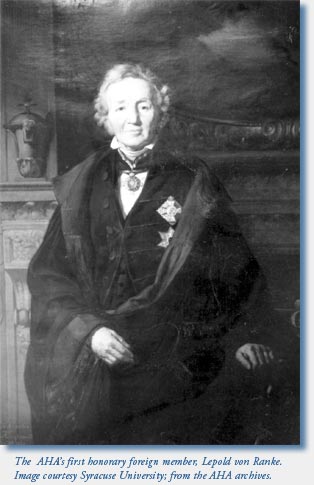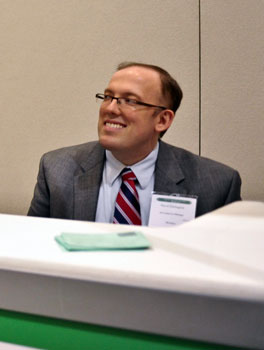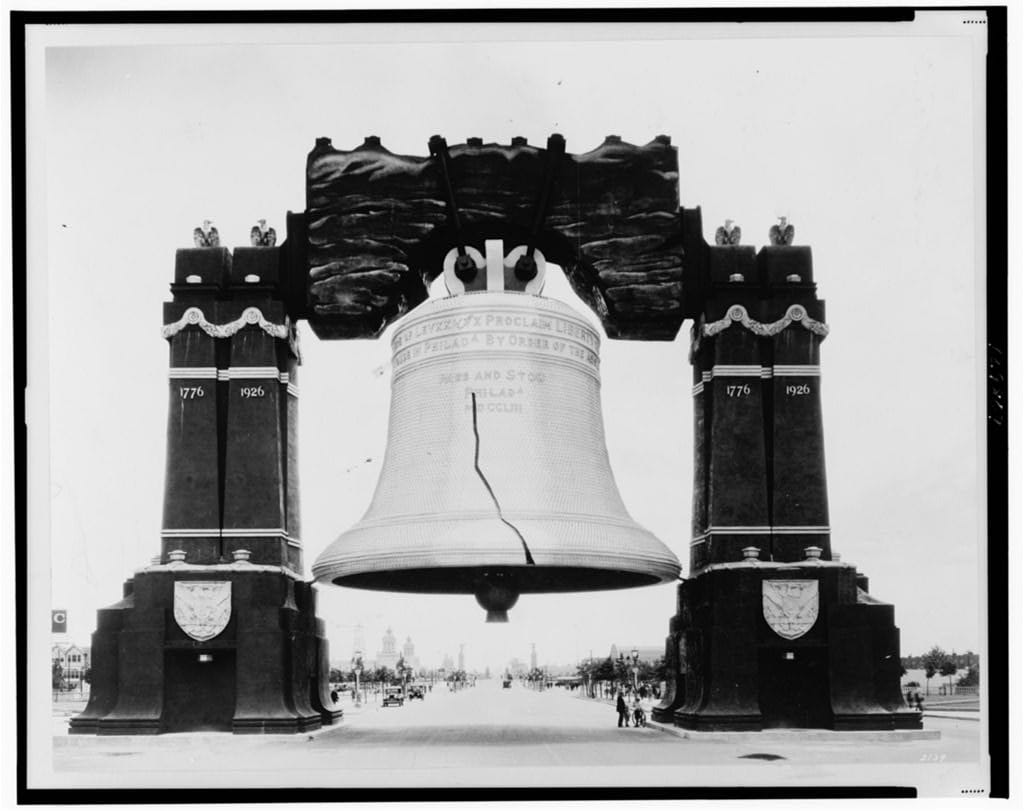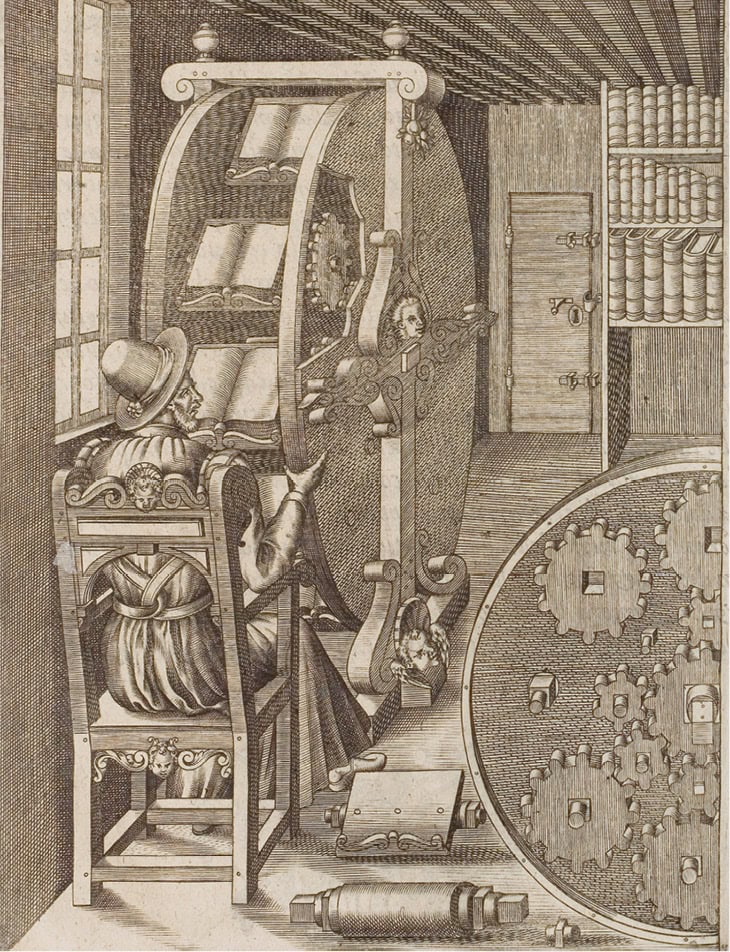Editor’s Note: This article on the history of the honorary foreign member award is the second in the “Timelines” series exploring events and items from the AHA’s history in celebration of the association’s 125th anniversary in 2009. The series began in January with Jessica Pritchard’s notes about the 1909 annual meeting in New York City.
The honorary foreign member is one of the AHA’s most prestigious awards for scholarly and professional distinction. According to the selection criteria, recipients of honorary memberships must be foreign scholars who are distinguished for their work in the field of history and who have markedly assisted the work of American historians in the scholar’s country. Though it hasn’t always been a regular award, the honor is now bestowed yearly at the Association’s annual meeting.
Leopold von Ranke
 The first person to be named honorary foreign member was the 19th-century German historian Leopold von Ranke. At the Association’s second annual meeting in Saratoga, New York, in 1885, the members adopted a resolution to honor von Ranke, whom they called the historical science’s “oldest and most distinguished living exponent,” and said that the organization was “desirous of signalizing its own devotion to pursuits which Leopold von Ranke has so conspicuously followed.” They directed the AHA’s then president, George Bancroft, to transmit to von Ranke “its first testimonial of honorary membership.” On December 5, 1885, Bancroft sent the following letter to von Ranke:
The first person to be named honorary foreign member was the 19th-century German historian Leopold von Ranke. At the Association’s second annual meeting in Saratoga, New York, in 1885, the members adopted a resolution to honor von Ranke, whom they called the historical science’s “oldest and most distinguished living exponent,” and said that the organization was “desirous of signalizing its own devotion to pursuits which Leopold von Ranke has so conspicuously followed.” They directed the AHA’s then president, George Bancroft, to transmit to von Ranke “its first testimonial of honorary membership.” On December 5, 1885, Bancroft sent the following letter to von Ranke:
My venerable Master and Dear and Most Highly Honored Friend—We have had many historical societies in our several States. We have lately founded the American Historical Association, which is to devote itself to the affairs of the United States of America. We wish for your benediction; and for that end we ask you, and, as yet, you alone, to accept the proof of our reverence by consenting to become our honorary member. We have meant this to make a special homage to yourself as the greatest living historian. I add my personal request to the request of the society that you will give us this mark of your regard. We thank Heaven that you approach your ninetieth year in the enjoyment of health. May you long continue the ever-increasing proofs of the honor and affection in which you are held by your fellow-men. Ever your very affectionate and devoted scholar and friend, George Bancroft.
On February 14, 1886, Leopold von Ranke wrote from Berlin:
In reply to your kind communication, I gratefully accept the position of an honorary member in the Association, to which I have been elected. It gives me great satisfaction to belong to a society pursuing beyond the ocean the same aims that we on this side are striving to achieve. Such unity of studies binds together peoples widely separated, yet allied by ancient kinship. It fills me with especial joy to see Mr. George Bancroft, one of the masters in our science, extending his hand to me from afar—a man who, during his residence in Berlin, bound me to himself by ties of reverential friendship. Accept my hearty sentiments and honor.
Leopold von Ranke died a few months later on May 23, 1886.
An Infrequent Award
The honorary foreign membership was not bestowed regularly following von Ranke’s selection. Two more honorary members were selected 13 years later in 1899: English historians Samuel Rawson Gardiner and William Stubbs, the bishop of Oxford and an authority on the English Constitution. In 1900, Theodor Mommsen of Germany was selected for honorary membership, and in 1906, James Bryce, who later served as British Ambassador to the United States, was selected. Then almost 40 years elapsed before the next foreign scholar was honored. In December 1943, AHA Council member J. Salwyn Schapiro nominated the Italian philosopher and critic of fascism, Benedetto Croce, for an honorary foreign membership, which the Council approved. Then, at the suggestion of Arthur M. Schlesinger, a committee was formed to suggest other names for recognition. The initial members of the Committee on Honorary Members were Waldo G. Leland, Guy Stanton Ford, and Bernadotte Schmitt.
The committee recommended and the Council approved the names of 10 more distinguished foreign scholars to join the ranks of honorary members in 1944: Rafael Altamira y Crevea (Spain); Domingo Amunátegui y Solar (Spain); Pierre Caron (France); Aage Friis (Denmark); Hu Shih (China), the first Asian scholar to be so honored; Johan Huizinga (Netherlands); Albert Frederick Pollard (Britain); Affonso de Escragnolle Taunay (Brazil), the first Latin American scholar to be awarded; George Macaulay Trevelyan (Britain); and George Mackinnon Wrong (Canada). Johan Huizinga had no knowledge of his election. The Netherlands was still occupied by Nazi Germany and it was considered inadvisable to attempt to communicate with him at the time. The Association received word of his death the following year.
Postwar Changes
After World War II, the Committee on Honorary Members recommended that the number of living honorary members at any one time should not exceed 15. Fifteen scholars were named honorary foreign members between 1945 and 1957, including the first Middle Eastern scholar, Costi Zurayk (Constantine Zreik) of Syria, and the first Indian scholar, Jadunath Sarkar, both in 1952.
In 1957 the Council increased the number of honorary members in the Association to a maximum of 25 and established the following principle for election: “Recognition should first be governed by scholarship, then teaching, then historical activities. Geographical consideration should enter in only after these primary criteria.” Eventually, the composition of the Committee on Honorary Members was changed as well, so that it was made up of the last five AHA presidents, who nominated individuals to the Council. Several notable names were added to the ranks of honorary foreign scholars in the 1960s, including the first Japanese scholars, Saukichi Tsuda (1960), Sei Wada (1961), and Yasaka Takagi (1963); the first two scholars from the Soviet Union, Mikhail N. Tikhomirov (1963) and P.A. Zaionchkovskii (1967); the first Korean scholar, Pyong-do Yi (1963); and the first former prime minister, Britain’s Winston Churchill in 1963.
The Committee on Honorary Members was disbanded in 1969 pending a study of how to make the award more meaningful.
Revival and Recent Practice
The practice of recognizing foreign scholars was revived in 1980 following recommendations from the Research Division, and honorary memberships began to be conferred on foreign scholars again, starting with 1981. Since then the honor has been conferred nearly annually. In its new incarnation, names for consideration for the honorary foreign membership are solicited from the AHA membership at large (through notices in Perspectives on History) rather than suggested by a committee. In 1990 Council further raised the limit on living honorary scholars to 30 and mandated that only one should be awarded per year to maintain the award’s special distinction. In 1993, an African scholar was named honorary foreign member for the first—and to date, only—time: Cameroon’s Martin Njeuma. The most recent winner was French historian Jacques Revel, who was recognized at the Association’s annual meeting in New York City in January 2009 (the citation for Revel will be printed in the March 2009 issue of Perspectives on History).
Also in the March issue, readers will find an In Memoriam essay for Russian scholar Nikolai Nikolaevich Bolkhovitinov, the 2005 recipient of the honorary foreign member award, who passed away in October 2008.
A full list of all the honorary foreign members going back to Leopold von Ranke can be found on the AHA web site.


